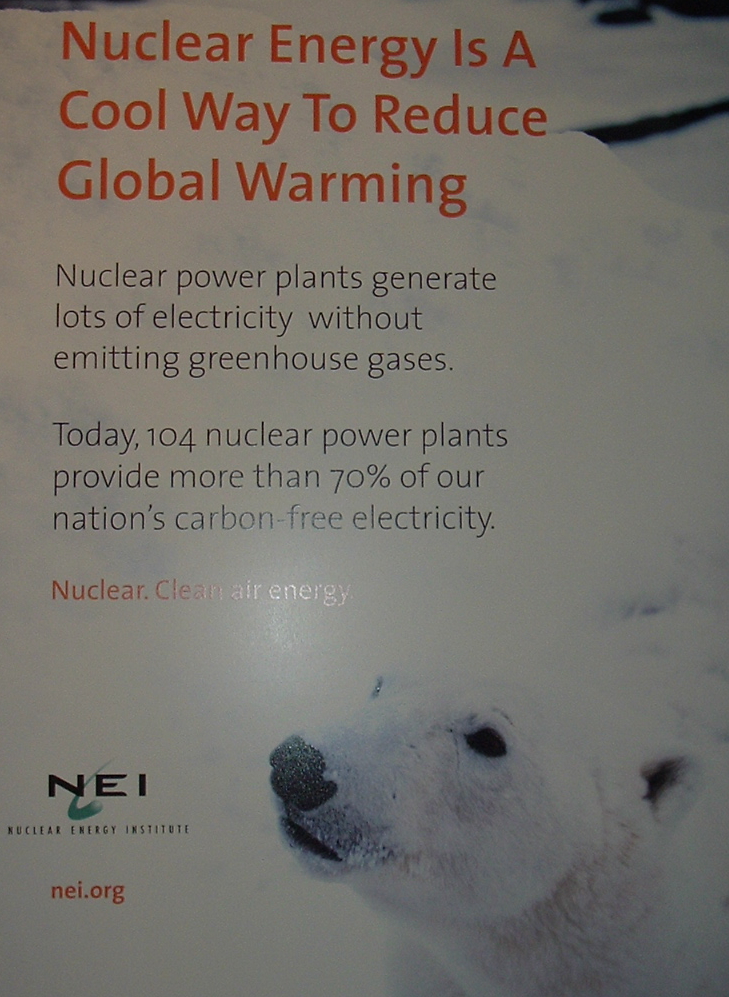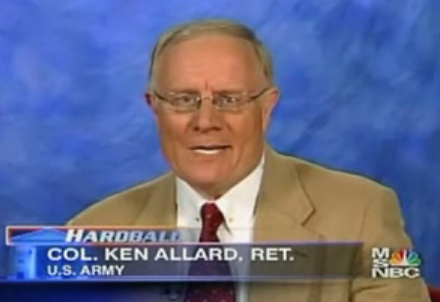Bigger Isn't Always Better
Submitted by Anne Landman on
 Colorado Republican candidate for U.S. Senate Bob Schaffer proclaims his devotion to the state in his latest television ad, saying "Colorado is my life ...
Colorado Republican candidate for U.S. Senate Bob Schaffer proclaims his devotion to the state in his latest television ad, saying "Colorado is my life ...

Submitted by Anne Landman on
 Colorado Republican candidate for U.S. Senate Bob Schaffer proclaims his devotion to the state in his latest television ad, saying "Colorado is my life ...
Colorado Republican candidate for U.S. Senate Bob Schaffer proclaims his devotion to the state in his latest television ad, saying "Colorado is my life ...
 I learned many things at the Nuclear Energy Institute's (NEI's) annual meeting, but perhaps none more surprising than this: When nuclear power executives discuss the state of their industry, they highlight many of the same issues as their environmentalist opponents.
I learned many things at the Nuclear Energy Institute's (NEI's) annual meeting, but perhaps none more surprising than this: When nuclear power executives discuss the state of their industry, they highlight many of the same issues as their environmentalist opponents.
Of course, the emphasis and even the language are different. But presenters at the "Nuclear Energy Assembly," held in Chicago from May 5 to 7, discussed financing for new nuclear plants, nuclear waste storage and nuclear weapons proliferation concerns.
Nuclear power opponents argue that the industry shouldn't expect or need government support, some fifty years into its existence. In a hotel conference room populated mostly with gray-suited older white men, industry executives repeatedly called for an expansion of federal loan guarantees for new nuclear plants.
Early on in the conference, NEI president and CEO Frank L. "Skip" Bowman said, "We use loan guarantees in this country to support ship building, steel making, student loans, rural electrification, affordable housing, construction of critical transportation infrastructure, and for many other purposes. Please don't tell me that America's electric infrastructure is any less important." He added, "I wish someone would tell me when the word 'subsidy' became a slur, a four-letter word. ... What is there of value in American life that is not subsidized, to some extent?"
Submitted by Diane Farsetta on
 "Prozac Nation: Revisited," a show that aired on U.S. National Public Radio member stations, "featured four prestigious medical experts discussing the controversial link between antidepressants and suicide. ... All four said that worries ...
"Prozac Nation: Revisited," a show that aired on U.S. National Public Radio member stations, "featured four prestigious medical experts discussing the controversial link between antidepressants and suicide. ... All four said that worries ...
Submitted by John Stauber on
AdAge reports that Fenton Communications and its client MoveOn.org have announced a politically liberal advertising consortium using corporate advertising executives and firms to "help change the playing field this year. ... At the moment it will go after presumptive Republican nominee Senator John McCain. ...
Eight thousand pages of documents related to the Pentagon's illegal propaganda campaign, known as the Pentagon military analyst program, are now online for the world to see, although in a format that makes it impossible to easily search them and therefore difficult to read and dissect. This trove includes the documents pried out of the Pentagon by David Barstow and used as the basis for his stunning investigation that appeared in the New York Times on April 20, 2008.
The Pentagon launched its covert media analyst program in 2002, to sell the Iraq war. Later, it was used to sell an image of progress in Afghanistan, whitewash the U.S. detention center at Guantanamo Bay, and defend the Bush administration's warrantless wiretapping, as David Barstow reported in his New York Times expose.
 But the pundits weren't just selling government talking points. As Robert Bevelacqua, William Cowan and Carlton Sherwood enjoyed high-level Pentagon access through the analyst program, their WVC3 Group sought "contracts worth tens of millions to supply body armor and counterintelligence services in Iraq," reported Barstow. Cowan admitted to "push[ing] hard" on a WVC3 contract, during a Pentagon-funded trip to Iraq.
But the pundits weren't just selling government talking points. As Robert Bevelacqua, William Cowan and Carlton Sherwood enjoyed high-level Pentagon access through the analyst program, their WVC3 Group sought "contracts worth tens of millions to supply body armor and counterintelligence services in Iraq," reported Barstow. Cowan admitted to "push[ing] hard" on a WVC3 contract, during a Pentagon-funded trip to Iraq.
Then there's Pentagon pundit Robert H. Scales Jr. The military firm he co-founded in 2003, Colgen, has an interesting range of clients, from the Central Intelligence Agency and U.S. Special Operations Command, to Pfizer and Syracuse University, to Fox News and National Public Radio.
Of the 27 Pentagon pundits named publicly to date, six are registered as federal lobbyists. That's in addition to the less formal -- and less transparent -- boardroom to war-room influence peddling described above. (There are "more than 75 retired officers" who took part in the Pentagon program overall, according to Barstow.)
The Pentagon pundits' lobbying disclosure forms help chart what can only be called a military-industrial-media complex. They also make clear that war is very good for at least some kinds of business.
Submitted by Bob Burton on
 The Chinese government has unveiled a new regulation that China View, an English language website of the government-owned Xinhua News Agency, reports "includes a 'freedom of information' provision that gives the public, whether individuals or organizations, the right to request governm
The Chinese government has unveiled a new regulation that China View, an English language website of the government-owned Xinhua News Agency, reports "includes a 'freedom of information' provision that gives the public, whether individuals or organizations, the right to request governm
Submitted by Bob Burton on
Almost two weeks after the New York Times reported on the Penatgon's military analyst program to sell controversial policies such as the invasion of Iraq, the broadcast television news outlets implicated in the program are hoping to tough out the scandal by refusing to report it.
Submitted by John Stauber on
 Author Glenn Greenwald notes, "It has now been more than ten days since the New York Times exposed the Pentagon's domestic propaganda program involving retired generals and, still, not a single major news net
Author Glenn Greenwald notes, "It has now been more than ten days since the New York Times exposed the Pentagon's domestic propaganda program involving retired generals and, still, not a single major news net
The Pentagon military analyst program unveiled in last week's exposé by David Barstow in the New York Times was not just unethical but illegal. It violates, for starters, specific restrictions that Congress has been placing in its annual appropriation bills every year since 1951. According to those restrictions, "No part of any appropriation contained in this or any other Act shall be used for publicity or propaganda purposes within the United States not heretofore authorized by the Congress."
As explained in a March 21, 2005 report by the Congressional Research Service, "publicity or propaganda" is defined by the U.S. Government Accountability Office (GAO) to mean either (1) self-aggrandizement by public officials, (2) purely partisan activity, or (3) "covert propaganda." By covert propaganda, GAO means information which originates from the government but is unattributed and made to appear as though it came from a third party.
Center for Media and Democracy (CMD)
520 University Ave, Ste 305 • Madison, WI 53703 • (608) 260-9713
CMD is a 501(c)(3) tax-exempt non-profit.
© 1993-2025